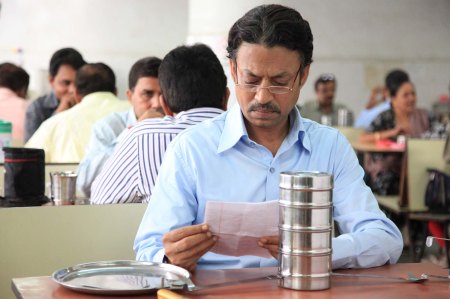The Lunchbox: A Review
The Lunchbox – Dir: Ritesh Batra; *ing: Irrfan Khan, Nimrat Kaur, Nawazuddin Siddiqui
Eat, Write, Love
The 70’s was, by most accounts (and, I would posit, inarguably) the best decade for cinema pretty much everywhere. It seemed as if in gearing up for the one hundredth anniversary of the birth of the moving image, filmmakers the world over were putting their best foot forward. While Hollywood was dazzling us with their young mavericks – Scorsese, Spielberg, Coppola, Friedkin, De Palma – Europe and Asia continued to astound with the old masters – Bergman, Fellini, Antonioni, Truffaut, Kurosawa. India, too, saw stalwarts Ritwik Ghatak, Mrinal Sen, and, of course, Satyajit Ray, being joined by young turks like Shyam Benegal and Mani Kaul in the ranks of independent cineastes creating a cinematic language parallel to the broader, conventional tropes of mainstream films. Nestled in between were the likes of Hrishikesh Mukherjee, Basu Chatterjee, and Basu Bhattacharya, who worked within the commercial framework of Hindi cinema, but employed a pared down mode of storytelling, focussing mainly on India’s urban middle class, that came to be known as middle-of-the-road cinema or, simply, Middle Cinema. After nearly three decades out in the cold, that school now stands revived (albeit, in a decidedly reimagined avatar) with The Lunchbox.
So, yes, by now you’ve most likely heard all the media gushing and fawning, and witnessed critics tying themselves into knots trying to come up with superlatives that would do justice to the film that should have been India’s entry for the Oscars. Well, add one more to the list of usually-snarky, verbose critics now stumped for words. Ladies and gentlemen, tarts and rotters, for once, the hyperbole proves to be kosher: The Lunchbox truly is all that it’s been trumped up to be, and more. Not only does it hark back to the gentler narrative sensibility of a bygone time (but with a wry self-awareness that makes it curiously modern at the same time), it also positions itself stylistically as a film that is ostensibly simple, but in reality quite breathtakingly complex (see, for example, its remarkable use of diegetic music).
Mumbai’s lunchbox delivery service is an intriguing enough subject to have been covered as both an extended feature by The Guardian, as well as on an episode of Top Gear, surely two of the modern world’s great socio-cultural markers. And this mind-boggling system of tiffins of home-cooked food being delivered by the ‘dabbawalas’ to the millions of the city’s mostly-suburban, middle-class office workers, forms the basis for the film’s central plot. About-to-retire government employee and widower Saajan Fernandez (Khan) mistakenly receives the lunchbox intended for Ila’s (Kaur) husband. He’s pleasantly surprised at the sudden surge in quality of his generic catered fare, while she’s savvy enough to figure out that the lunchbox which regularly comes back barely touched, must have been cleaned out by someone with far more refined taste than her spouse. Instead of putting the matter right, though, the two start exchanging notes through the lunchbox, carefully packed in the bottom compartment, each communique a bite of past, present, and future, hopes, dreams, disappointments, and secrets. In an age of instant gratification of every nature, Ila and Saajan rediscover the allure, the flavour, of waiting, of anticipation, of the unseen, of the all-too-real (and thrilling) possibility of whatever it is they have come to share slipping out of their grasp at the simple righting of a random human error. Is it friendship? Companionship? Love? It would perhaps be disingenuous to try to coax this interaction into any one narrowly defined narrative construct, seeing as even the script is wary of doing so. Instead, perhaps we are meant to see Saajan and Ila as each other’s keyhole view of another life, the confines of one challenging the conformity of the other, to the point where change is not only a possibility but also inevitable. Neither of these lives can be the same again, with, or without, each other.
Writer/director Batra must be commended here for two things, among others: for his sensitive handling of a tender story, as well as having the foresight to lend the proceedings a deft light touch. As a result, The Lunchbox is moving, but not melodramatically so, and slyly witty, but not in a way that would make the characters seem like ciphers for a standup writer’s oeuvre. The film works so well precisely because Saajan, Ila and the supporting character of Shaikh, Saajan’s eager-beaver replacement-in-training (Siddiqui), are never less than utterly believable, thanks to how they are described on paper and then, of course, further defined on screen by the actors playing them. Nimrat Kaur brings a quiet, unassuming intelligence to her role, which is equal parts endearing and haunting; note especially the part where she very matter-of-factly writes to Saajan about her husband’s extra-marital affair. Siddiqui’s affable ‘everyman’ persona is put to wonderful use here; his performance turns his peripheral character into an integral one. But it is Khan who towers, even as he moves through long silent passages, making terms like ‘revelation’ and ‘masterful’ seem futile, feeble, and completely inadequate to describe in words what he brings to the screen. Suffice to say, it is the performance of the year, in any language.
And, by extension, The Lunchbox is, at least for this critic, the film of the year.
Cult: Charulata (1964) – Satyajit’s Ray’s adaptation of Tagore’s story about a lonely wife seeking solace with another man, is one of the Bengali cinema legend’s greatest works.
Current: The Ship of Theseus – Along with The Lunchbox, this experimental entry from Anand Gandhi has helped to bring non-Bollywood Indian fare to the fore this year.
Coming Attraction: Untitled Hamlet Project – Irrfan Khan has reportedly signed on for director Vishal Bhardwaj’s third Shakespeare adaptation.

Leave a comment